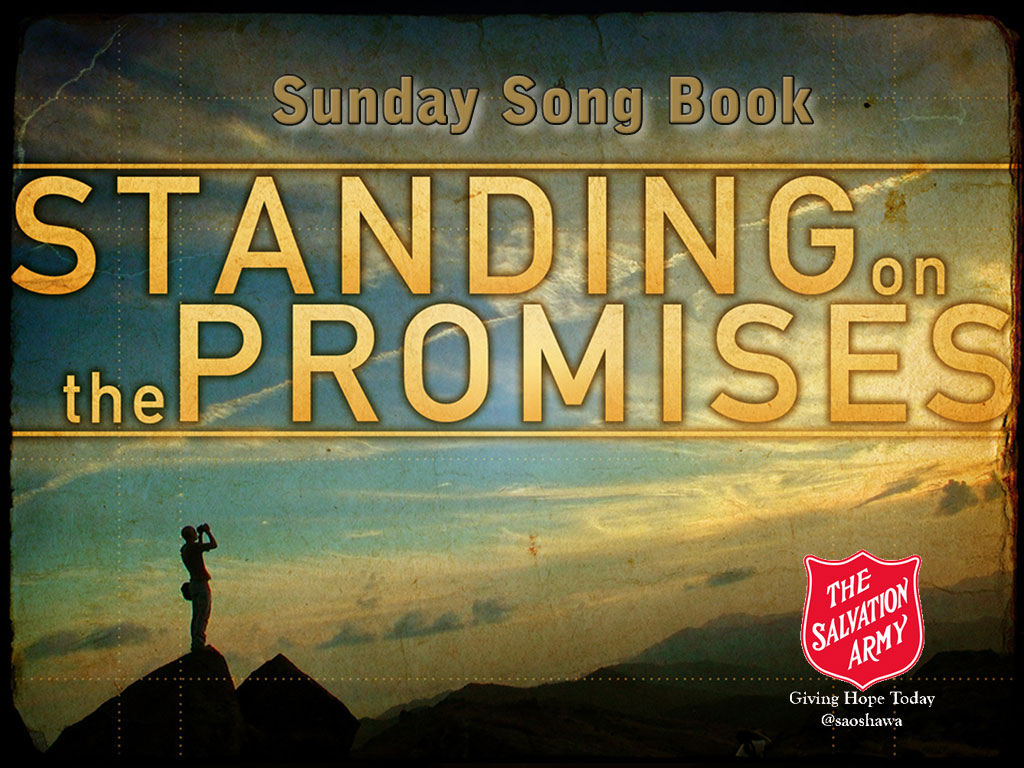Standing on the promises of Christ, my King;
Through eternal ages let His praises ring;
Glory in the highest, I will shout and sing,
Standing on the promises of God.
Standing, standing,
Standing on the promises of God my Saviour;
Standing, standing,
I’m standing on the promises of God.
Standing on the promises that cannot fail,
When the howling storms of doubt and fear assail;
By the living Word of God I shall prevail,
Standing on the promises of God.
Standing on the promises of Christ my Lord,
Bound to Him eternally by love’s strong cord,
Overcoming daily with the Spirit’s sword,
Standing on the promises of God.
Standing on the promises I cannot fall,
Listening every moment to the Spirit’s call,
Resting in my Saviour as my all in all,
Standing on the promises of God.
Standing on the promises I now can see,
Perfect, present cleansing in the blood for me;
Standing in the liberty where Christ makes free,
Standing on the promises of God.
 Russell Kelso Carter wrote both the words and music of this hymn sometime after consecrating himself wholly to God at the age of thirty. The following is a summary of his testimony, as recorded by Robert J. Morgan.
Russell Kelso Carter wrote both the words and music of this hymn sometime after consecrating himself wholly to God at the age of thirty. The following is a summary of his testimony, as recorded by Robert J. Morgan.
“From my birth I was surrounded by Christian influences. I cannot remember when I was not subject to deep convictions of sin, yet, as a schoolboy, I wandered from the truth until age fifteen, when, under the influence of the cadet prayer meeting in the Pennsylvania Military Academy, I made a profession of faith in Jesus. But I made a common mistake: I didn’t forsake my old companions and habits, and for fourteen years I lived the up-and-down experience so familiar to the average church member.
My soul cried for deliverance, and God’s unlimited promises stood out like stars above me, but I wasn’t willing to pay the price.”
My soul cried for deliverance, and God’s unlimited promises stood out like stars above me Share on XCarter goes on to tell about having had a diseased heart for seven years, with no medical remedy having cured him. After three years of sheep ranching in California, he was near death. He wanted to try praying for healing, but felt it would be blasphemous to ask God for strength which he wasn’t planning to use completely for Him. Russell Carter knelt in his mother’s room in Baltimore and made his complete consecration. He says of this:
“All doubtful feelings were swept aside. I meant every word, and I have never had any doubts about it since. A quietness came over me and I found the Bible wonderfully open and marvelously satisfying, as it had never been before. I concluded to go to Boston and ask prayer and anointing at the hands of Dr. Cullis. I was terribly weak, but I went. I returned in three days, walking by faith and not by feeling, resumed my college work in September, and at once engaged in all kinds of religious work. I was healed by the power of God alone. Praise the Lord!”
Carter then lived until the age of almost seventy seven. He was ordained as a Methodist minister, but later became a physician in Baltimore. He contributed hymns and tunes to Hymns of the Christian Life, 1891 , which he edited with the Reverend Albert B. Simpson for the Christian and Missionary Alliance.
I meant every word, and I have never had any doubts about it since. Share on XWORDS AND MUSIC: RUSSELL KELSO CARTER
S.A. SONG BOOK, 2015 EDITION, # 522, 1987 EDITION, #757
REFERENCES: MORGAN, ROBERT J., THEN SINGS MY SOUL / S.A. SONG BOOK WEB SITE – USA WEST.ORG







